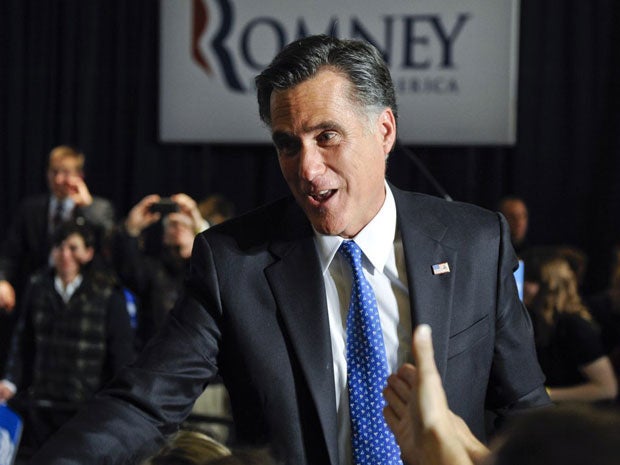Richard Wolffe: Mitt Romney's underwhelming performance does not fully explain Iowa's extraordinary three-way split

You can't blame Mitt Romney. It may be easy to be beastly to the unloved Republican presidential frontrunner. He may well look like "the guy who laid you off," as one former conservative rival quipped. He may well have spent the last four years and as many millions (with the help of anonymous supporters) going nowhere in Iowa: he gained almost exactly the same number of votes yesterday as he did in 2008.
But his underwhelming performance does not fully explain Iowa's extraordinary three-way split in the first real contest for the Republican presidential nomination. No, the real culprit is the confused state of American conservatives.
Romney's pretzel-shaped politicking is a perfectly rational reaction to a party that is dazed and confused. As a former Massachusetts governor, who tried and failed to beat the late Ted Kennedy from both the left and right, he finds no natural place in a party now defined by the extremism of the angry anti-Obama Tea Party and the loopy libertarianism of Ron Paul.
Conservatives in the United States have fractured into their constituent groups with no unifying leader to bring them back together. That was the role traditionally played by the Bush family. But Jeb Bush, the former Florida governor, has resisted the many loud calls to enter this year's contest.
His older brother George is barely mentioned by the candidates who would follow in his footsteps. Not because of the colossal waste of blood and treasure in Iraq, but because he now looks too moderate to win his own party's nomination. Bush's record would disqualify him from the current GOP race: he pushed for immigration reform, expanded government-funded health care for seniors, believed that Washington could help raise education standards, and supported green energy technologies.
Bush's failings were followed not by a period of reflection and reform but by intense resentment against the centrist Democrat who won in a landslide. Republicans never left the first two stages of grief - denial and anger - and most firmly reject the third stage, of bargaining. That's partly because their extreme response to Obama actually succeeded in winning House seats in the mid-term congressional elections in 2010.
In British terms, Republicans are the Labour Party of the early 1980s, with Barack Obama playing the same unlikely role as Meryl Streep is at the cinema. The ideological rifts are no smaller than those dividing the hard-core socialists from the SDP centrists, and there remains a significant chance that one faction or other will break off to form an independent challenge from the right or left.
Obama has left the GOP suffering from at least two delusions. One is that it is easy to come out of nowhere to win the presidency; as if Obama won in 2008 with little more than a brief resume, and had no strategic sense, political talent or national organisation. The second is that Obama represents something fundamentally un-American: a diverse coalition of moderates who look little like the Republican base. As long as Republicans believe that Obama is an alien and hopeless amateur who could lose to a ham sandwich, they will entertain any extreme alternative.
At Obama's campaign headquarters in Chicago, there are at least two reasons to savour what promises to be a protracted Republican contest. The first is that Romney can now expect to endure the same aggressive onslaught his supporters inflicted on his last conservative rival, Newt Gingrich. The former House speaker now promises to return the favour with a cherry on top.
The second reason to be cheerful in Chicago is the sight of Romney's uncomfortable performance in front of real, live voters. In his stumbling victory speech last night, Romney managed to speak to the world not about the struggling economy - his singular focus, as a former venture capitalist - but about Obama's policy towards Iran. Romney presumably thought his position on Iran would demonstrate his right-wing bona fides to people scared by Ron Paul's anti-war position.
In contrast, his newly-minted rival, the Christian conservative Rick Santorum, began his victory speech with a poignant tale about paying his respects to his recently deceased grandfather: a coal-mining Italian immigrant in Pennsylvania, the battleground state he represented as senator for 12 years. Santorum has a human, blue-collar appeal that will only grow as other candidates drop out of the contest.
In the meantime, Obama's campaign quietly organised an uncontested caucus in Iowa that gathered almost as many voters as showed up for Romney. Anyone clicking on the home page of the Des Moines Register found a wraparound ad touting the promises Obama kept in the last four years: making health care affordable, cutting taxes for working Americans, raising fuel efficiency standards, and ending the war in Iraq.
The message for Iowa voters was simple: you can trust Obama to deliver. The message for political insiders was just as clear: the longer Romney battles his own party, the more Obama can rebuild his own.
Join our commenting forum
Join thought-provoking conversations, follow other Independent readers and see their replies
Comments
Bookmark popover
Removed from bookmarks